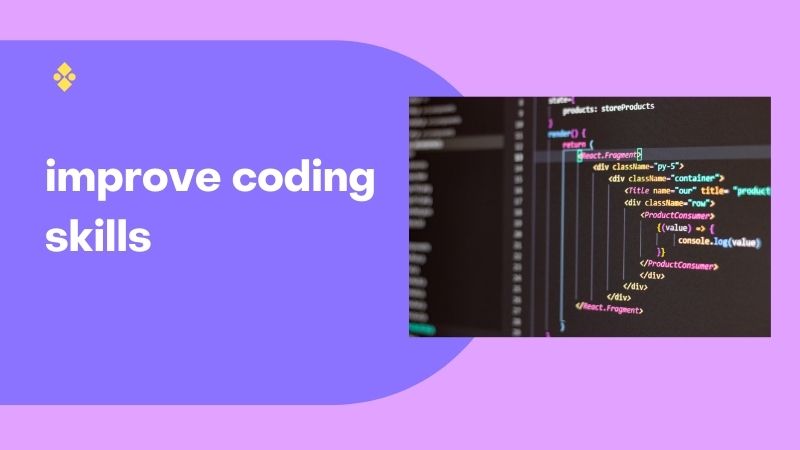For beginners, “I want to get better” means that you want to understand every concept from scratch. That’s a straightforward, professional advancement objective to set for oneself, but becoming a bad coder is not worth it. Similarly, too many people aim for progress without knowing how to get there. Some online professionals have years of experience in the computer business and have improved their coding skills. You have to be up-to-date in computer programming because they change according to the latest technology and the demands. So, here are eight practical suggestions which help to improve coding skills and may be used as a flowchart to help you improve your programming abilities.
Let’s Discuss Some Points That Help You To Improve Coding Skills Are As Follows –
1. How Much You Learn Always Reminds You That Recognizing
You don’t know something is the first step in code. That may seem self-clear, but experienced programmers recall how difficult it was to overcome this. Too many computer science graduates think that “I know the best” and want to show it to every new co-worker. In other words, the attitude of “I know what I’m doing!” might interfere with acquiring new skills.
2. Don’t Try To Prove Yourself Right
You must learn from experience to become great, not simply excellent. However, be careful since experience can encourage us to repeat harmful behavior and form bad habits. We’ve all met programmers who had some years of experience, and they think this is done. To avoid this type of feeling, examine everything you do and ask yourself, “How can I improve coding skills?” Instead of making the code fail, try to test and verify that it works. Great programmers constantly seek out areas where they are incorrect, knowing that consumers will ultimately discover the faults they missed.
3. Try To Learn The Whole Code
“The code works” isn’t the end; it’s the beginning. The first step is always to build high-quality software that meets the requirements. At that time, most programmers give up and go on to the next project. But good programmers never give up and try to be better. Determining what “better” means is a part of that process. When you write a code and discover the output, it is not finished. Think more for the better and write more code for discovering better output.
4. Write That Code Three Times
Good programmers create functional software. That doesn’t usually happen on the first try. Typically, the finest software is written three times –
-
- Firstly, you must develop software to demonstrate that the solution is feasible to yourself (or a client). Others may not notice that this is merely a proof of concept, but you are aware of it.
- You make it work the second time around.
- You finally get it to work the third time.
When you look at the work of the finest developers, this degree of labor may not be visible. Everything they make appears to be fantastic, but what you don’t see is that even professional developers are likely to have discarded the first and second versions of their program before presenting it to anybody else.
5. Read Code
Some people read the code of others and want to see how someone else addressed a programming challenge by reading other people’s code. So, don’t think of a code as literature; rather you just consider it as a lesson or a challenge. To improve coding skills, consider the following questions –
-
- What would I have done if I had to write that piece of code? Now, you focus on how you do it differently?
- What did I discover? It means that the method or code you have already written can change according to the latest technology.
- How would I make this code better? And if it’s an open-source project, you know you can provide a superior answer.
- Create code that follows the author’s style. Doing more practicing will allow you to put yourself in the place of the programme creator.
6. Write Code, Not Just As Assignments
There are several advantages to working on personal programming projects. For beginners, it allows you to learn techniques and technologies that aren’t accessible at your present work but will make you more marketable when you move on to the next one. You’ll learn technical skills and self-confidence whether you contribute to an open-source project for a local community group.
7. Do Steps-By-Steps
Listening to other people is beneficial. Pay attention to the comments you get from users and other developers when contributing to an open-source project. If you are doing any project, you need to move step-by-step so that nothing can miss and it works properly.
8. Learn Techniques, Not Tools
Languages, tools, and approaches for programming come and go. That is why it is beneficial to have as much expertise as possible with various languages and frameworks.
Conclusion
Students always think that whatever code they write is enough to get an answer, and you stop thinking, but there is no end to coding. Coding means different experiments you can do in writing code but in a different style. If you want to improve coding skills then you have to do more practice steps-by-steps. You have to learn techniques, not a tool, for a better approach to programming.
Programming is difficult to understand because it is vast and if you start from scratch, it becomes easy for you. While studying, there are multiple assignments to do, and coding practice is sometimes behind. So, if you want guidance for helping you in learning to code, you can go for online help to improve coding skills.
See More:
- Website Translation Services
- Several Ways That Productivity Add-ons
- How To Plan A Web Application
- Machine Learning and Data Analytics in the Travel Industry
